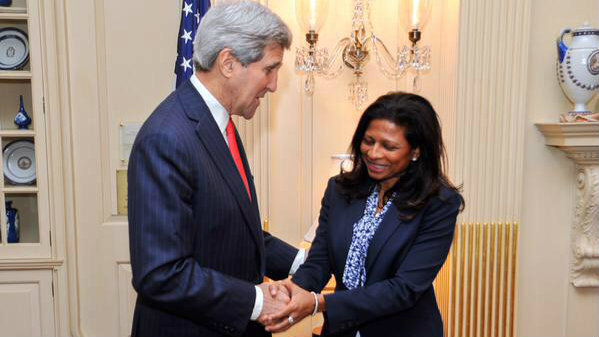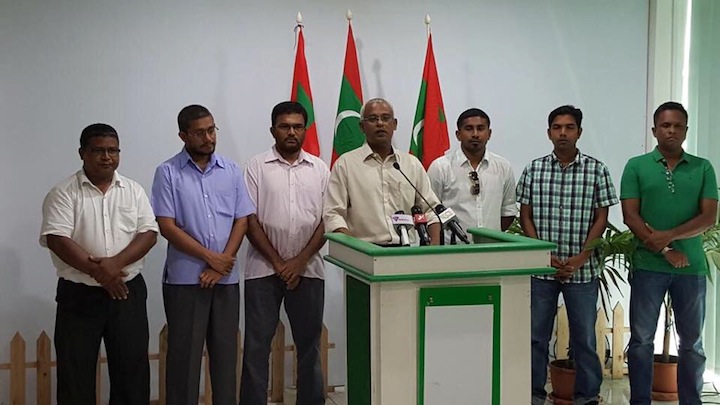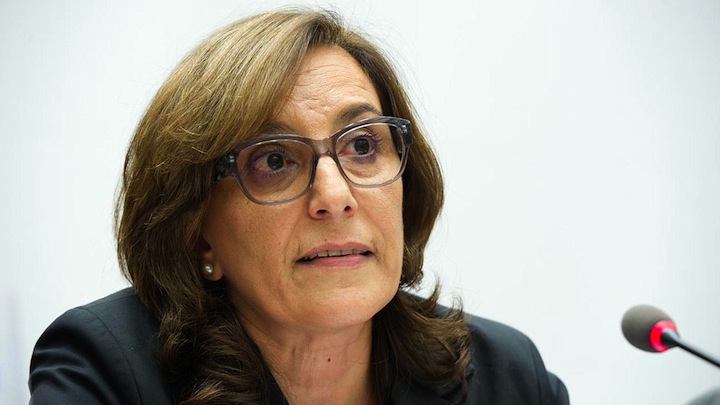The criminal court has remanded scores of antigovernment protesters for 15 days as the opposition began a new effort to rally supporters following a crackdown on May Day’s protest.
According to lawyers, of the 194 arrested, only 19 were released, but only because the police had failed to present them at court within the 24-hour period required by law.
The numbers arrested yesterday are the largest from a single protest in ten years.
Adhaalath Party president Sheikh Imran Abdulla, Jumhooree Party deputy leader Ameen Ibrahim and Maldivian Democratic Party (MDP) chairperson Ali Waheed were also detained for 15 days.
Mudhath ge majlis ah @ali20waheed @ShimranAb @ameenmaldives haaziru kohfi pic.twitter.com/YBMwfBeeTe
— Mohamed Afsal (@afsal_afey) May 2, 2015
The three were arrested under court warrants late last night.
One man was sentenced to six months in jail for contempt of court when he accused a judge of corruption. Anil Mufeed of Addu City reportedly told a judge: “Thank you for the reload.”
Court reporters said a judge asked the 19 who were released: “Were you arrested while you were prostrating before god?”
Former MDP MP Ahmed Easa was limping when he was escorted inside the court building.
The roads leading to the criminal court were closed for most of the day for the remand hearings causing traffic jams in the area.
Tens of thousands had taken to the streets yesterday over the jailing of ex president Mohamed Nasheed and increased authoritarianism by the government.
Opposition leaders had said they would force President Abdulla Yameen to release jailed leaders and start negotiations.
The march was peaceful, but clashes erupted between protesters and police at dusk when thousands attempted to enter the city’s main square. Police used stun grenades, thunder flashes, tear gas and pepper spray to control the crowds.
Hundreds were injured in the crackdown and two police officers were severely beaten by protesters.
The government has labeled the protest a failure and held a fireworks display tonight in celebration. The ruling party has also threatened to dismiss any government employee who took part in the protest.
The opposition meanwhile held a rally at the Artificial Beach at 9pm tonight, where leaders encouraged the crowd of just over a thousand people to continue to have faith.
The mood was somber as police prevented the protesters from leaving the Artificial Beach area on a march. They also ordered protesters to go home by 12am.
Artificial Beach gai kuriyah dhaa Evvumuge thereyn #AniyaaverikanNinman pic.twitter.com/d37W5Cq0h3
— MDP Secretariat (@MDPSecretariat) May 2, 2015
Speaking to supporters, MDP MP Imthiyaz Fahmy noted growing international pressure on the government to release Nasheed and said the Maldives could not afford to be a pariah state.
“The government wants to govern like North Korea. But this is not possible. Keep faith. Don’t lose your determination. This is why we remain steadfast in fighting for our rights,” he said.
Former environment minister Mohamed Aslam said: “We must resolve to protest in Malé again, to gather numbers larger than May 1.”
Independent MP Ahmed Mahloof said freedom and democracy came through long struggles and said the opposition will remain steadfast.
“You cannot drown out our voices. We will keep going forward,” he warned the government.
Adhaalath Party, JP and MDP leaders attended the rally. The crowd called for the release of protesters and jailed opposition leaders.



